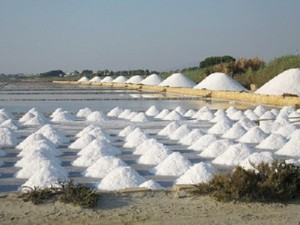Sittwe: Salt industry, a major production business in Arakan State, faces ruin from continuous losses, said an executive director of the Arakan State Salt Industry Association.
 “There are about 30,000 peoples living off salt farming in Arakan State, with an additional 50,000 people in Irrawaddy. The salt-farmers dare not to start their business even though the season has already started because they have suffered from losses for three consecutive years”, said the director.
“There are about 30,000 peoples living off salt farming in Arakan State, with an additional 50,000 people in Irrawaddy. The salt-farmers dare not to start their business even though the season has already started because they have suffered from losses for three consecutive years”, said the director.
Salt farming usually starts at the end of rainy season and with the onset of winter in coastal Arakan State. It is already winter in the region, but the farmers are still unable to start their business.
The director said about 70,000 tons of salt produced in urban and rural areas in Arakan State still remaining unsold and the salt farmers in the region.
“We have tried to export our salt to Bangladesh. So far, we have exported 3,500 tons. We are still negotiating with the traders from Bangladesh so that we can sell them another 7,000 tons. But they have asked us to reduce our price”, he said.
The salt produced from Arakan State are said to be mixed with mud deposits and in very low demand in Bangladeshi markets.
“We sold them 60 kyat a viss (1.63 kg) before. Now they have asked us to reduce to 55 kyat. We have to bear all expenses and taxes until the salt is loaded onto their boats. But we have to sell our salt with the price we get because we have no other market for our product”, he said.
The salt being produced in Arakan State is a mere raw product which cannot compete with the salt qualities produced in neighboring countries as the Arakanese farmers are so poor that they are unable to invest in modern techniques for their production.
A salt-farmer from Rae Kyaun Island in Arakan’s Man Aung Township said there are differences in salt production between Burma and Bangladesh.
“We Arakanese farmers are unable to spread plastic sheets in the fields like the Bangladeshi farmers are doing for drying salts. Plastic sheets are expensive here and we cannot afford to buy them. We have to dry salt waters on the ground without plastic sheets and the salt deposits become mixed with the mud. This is the way the Bangladeshi farmers are producing better quality salt without mud”, said the farmer.
The director of the Salt Industry Association also said the government has provided the salt-farmers with advice on the latest techniques for developing their production, but they still do not have sufficient investment to follow the advice.
“The main problem is that the farmers do not have sufficient investment. So, it is very difficult for them to adopt modern techniques. In the present situation, they have suffered from losses and most of them will not be able to carry on their business this year”, he said.
It is learnt that Arakan State is one of the main regions that produce salt in Burma, but there is still no factory to refine the raw salt in the region.
According to Arakanese salt farmers, they want the national government to prop up their salt industry that is now facing ruin with great losses by providing subsidies to them and establishing salt refineries in their region.



